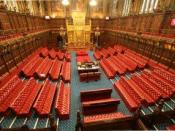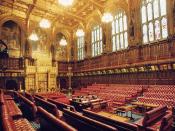Do you think that the courts should have a statutory discretion to determine the effects of illegality in resulting trust cases?There is much debate and discussion amongst many commentators in relation to illegality and whether the courts should have a statutory discretion to determine the effects of it in resulting trust cases. It is clear that there is a great deal of confusion, uncertainly and complexity relating to this area, particularly in relation to the maxim 'he who comes to equity must come with clean hands'.# An area of much controversy has arisen in relation to where the presumption of a resulting trust appears to collide with the principle that equity does not assist a person with unclean hands. There have been a number of important cases in relation to this, with somewhat conflicting decisions, for the purpose of this essay, only a few important cases will be discussed as it would be impossible and impractical to discuss all the cases in this area.
The House of Lords case, Tinsley v. Milligan# highlights the need, suggested by many commentators, that reform is needed in this area. In this particular case, a house was brought with the money provided by two women, but was only put into the name of one of the women (the claimant) so that the other woman (the defendant) could claim housing benefit. The defendant claimed that the property was held for her on a resulting trust by virtue of her contributions. Dunnington# notes the issue here was the conduct which the defendant had to rely on to support her claim of resulting trust. If it was her fraud then she could not claim a resulting trust, however, here she only had to rely on her contributions to the purchase price and so her claim succeeded as...


